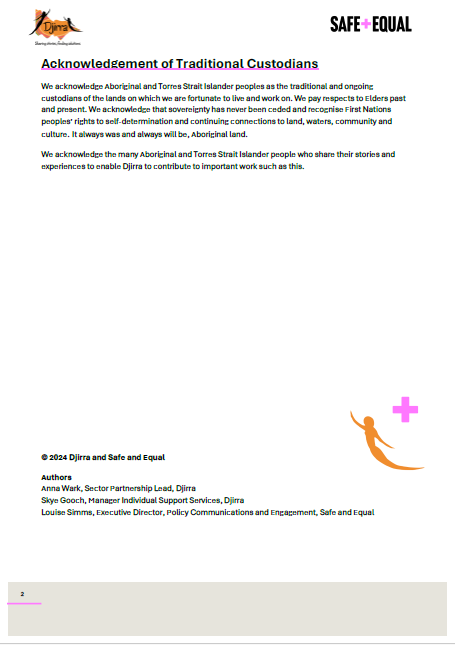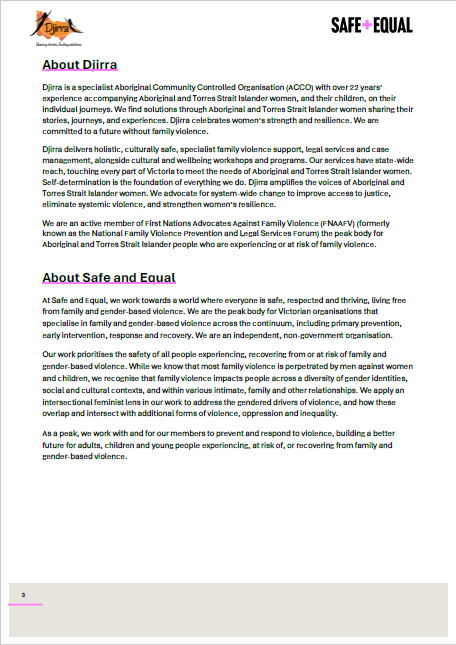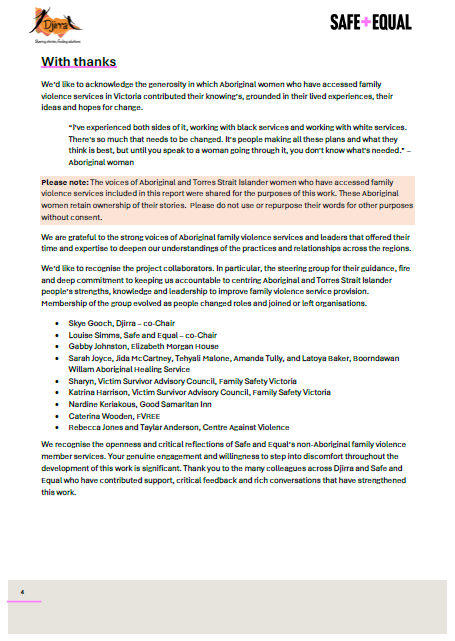Aboriginal and Torres Strait Islander people have the right to access culturally responsive, inclusive, and equitable family violence support, no matter what kind of service they go to.
It is crucial that non-Aboriginal family violence services uphold Aboriginal and Torres Strait Islander people’s rights to self-determination, choice, and safety.




This report, developed in partnership between Djirra and Safe and Equal, summarises research, policy frameworks, and Aboriginal women’s lived experiences, alongside insights from both Aboriginal and non-Aboriginal family violence service providers. It examines the strengths, weaknesses, and gaps in non-Aboriginal family violence services support for Aboriginal people.
These findings will guide the development of actions to ensure non-Aboriginal family violence services uphold Aboriginal and Torres Strait Islander people’s rights to self-determination, choice, and safety.
More information
There are many essential frameworks that outline responsibilities and requirements for providing culturally safe and responsive services to Aboriginal people, which apply to specialist family violence services. However, alignment to these frameworks is usually self-assessed and, in the absence of strong accountability mechanisms, these responsibilities are not upheld consistently.
Upholding Aboriginal and Torres Strait Islander people’s rights and confronting the racism and Whiteness that remains embedded, invisibly and strategically, within the service system requires sustained effort. Without meaningful, ongoing action, Aboriginal women and children will continue to experience devastating consequences:
“The odds are all stacked against us. We’re a Black family. We’re going through family violence. You want to get out …get the help. But the first thing we worry about is our babies. The minute we disclose the fact that we’re gone through family violence, the Department is notified. And that alone makes women not want to disclose…it took me six years to even tell…I wanted out of the situation I was living in, but I was too scared because my babies. And in the end, I lost them anyway…held on for as long as I could and still couldn’t protect my children.” – Aboriginal woman
The specialist family violence sector has a critical responsibility to improve service responses and outcomes for Aboriginal and Torres Strait Islander people. When non-Aboriginal services fail to demonstrate confidence or competence, it is Aboriginal communities that bear the cost:
“I get the fear around it. People were so scared of saying and doing the wrong thing. But that’s not my problem and it’s not our community’s problem. Do whatever the hell you gotta do to train yourself up because our community shouldn’t have to be the ones that are paying for your lack of confidence in this space.” – Aboriginal family violence service
It is imperative for the non-Aboriginal family violence services to foster equitable relationships with Aboriginal Community Controlled Organisations, without imposing demands and expectations. Ultimately, both Aboriginal and non-Aboriginal services are working towards the same intention, to ensure the safety and agency of Aboriginal people experiencing family violence:
“I guess for those who work in family violence, we all want the same outcome. We just want that person experiencing family violence to be safe.” – Aboriginal family violence service
